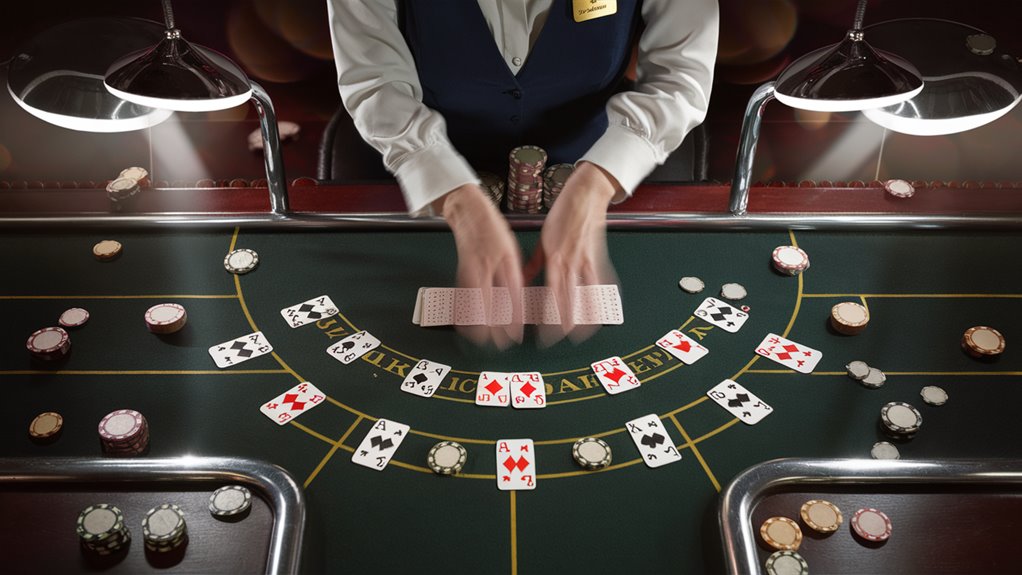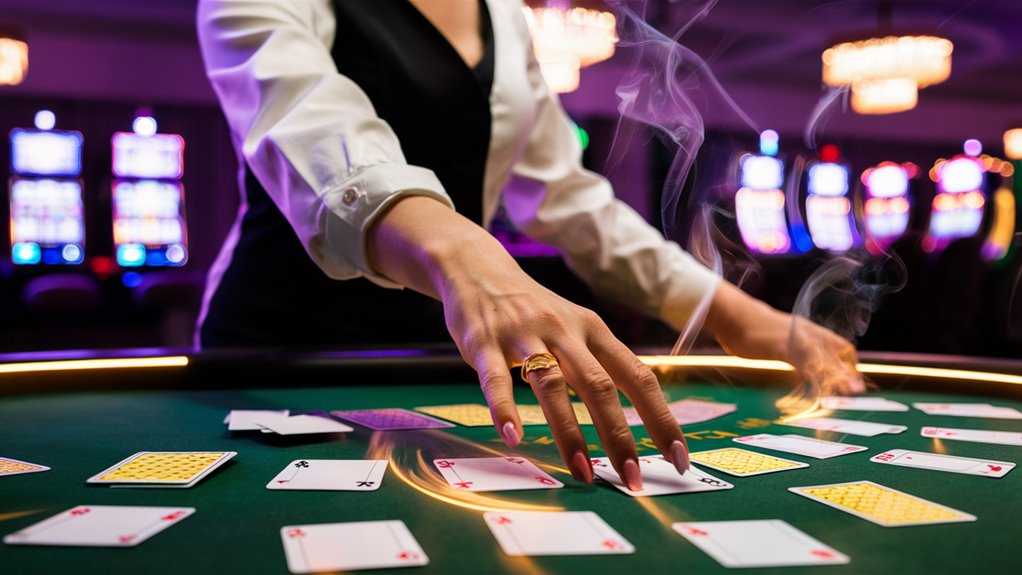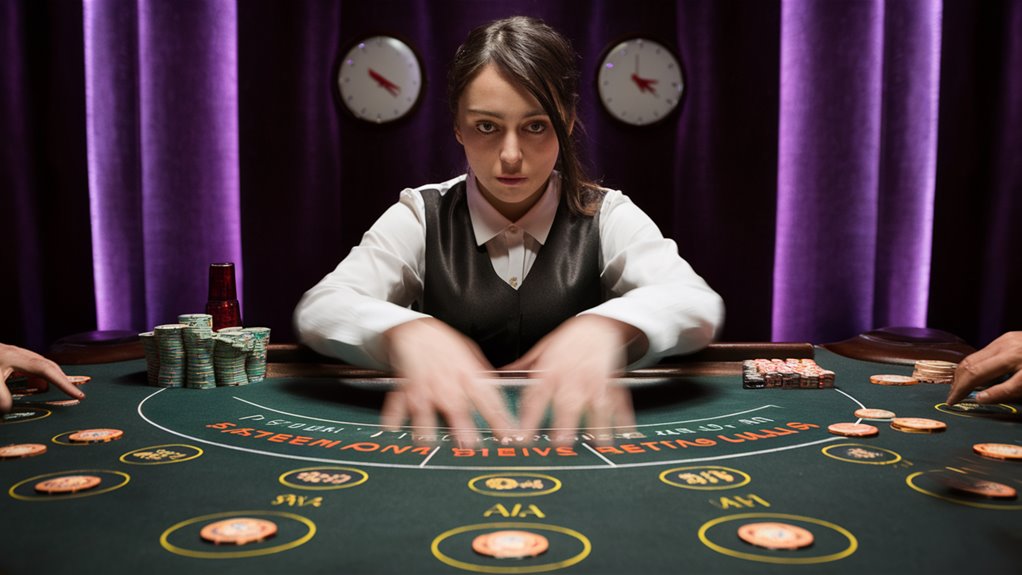
Late-Night Blackjack: Understanding Evening Dealer Transitions
Late-night blackjack dynamics present unique characteristics during the midnight to early morning hours, particularly between 11 PM and 4 AM. These transitional periods offer distinct patterns worth analyzing for strategic gameplay enhancement.
Key Timing and Dealer Patterns
The most significant variations occur during dealer shift changes, typically manifesting in:
- 15% fluctuation in basic strategy execution
- Modified table energy and pace
- Altered betting patterns among remaining players
- Varied penetration rates between 5-10%
Strategic Adjustments for Evening Play
Optimal betting spreads of 1-6 units become particularly relevant during these hours. Table conditions demonstrate measurable changes in:
- Reduced occupancy levels
- Modified supervision routines
- Altered gameplay rhythm
- Dealer rotation impacts
Late Hours Advantage Analysis
The period between 2 AM and 6 AM presents distinct characteristics affecting gameplay:
- Decreased table pressure
- Modified dealer attention spans
- Adjusted operational procedures
- Variable game pacing
#
Frequently Asked Questions
Q: What are the prime hours for late-night blackjack?
A: The optimal window typically falls between 11 PM and 4 AM, with peak variance occurring from 2 AM to 6 AM.
Q: How do penetration rates change during late hours?
A: Late-night sessions commonly see a 5-10% decrease in penetration rates compared to peak hours.
Q: What betting spreads work best during evening transitions?
A: A 1-6 unit spread typically provides optimal flexibility during these hours.
Q: How does dealer rotation affect gameplay?
A: Dealer rotations influence game pace, attention levels, and overall table dynamics.
Q: What operational changes occur during late hours?
A: Late hours see modified supervision patterns, altered table occupancy, and adjusted dealer rotation schedules.
Dealer Shift Transitions

Dealer Shift Transitions in Casino Blackjack: Best Practices & Protocols
Essential Shift Change Procedures
Professional table transitions require precise timing and coordination to maintain game integrity. The optimal window for dealer changeover occurs when the incoming dealer arrives approximately two minutes before the scheduled rotation. This allows for proper ID verification and completion of mandatory shift documentation.
Critical Security Checkpoints
Hand Completion Protocol
- Final hand announcement by 먹튀검증 보증업체 outgoing dealer
- Chip tray verification against recorded values
- Direct supervision during count procedures
- Face-up card display and inventory check
Transition Requirements
- Complete card accountability
- Documented chip count
- Shuffle demonstration for players
- Pit boss authorization
FAQ: Casino Dealer Transitions
Q: How long does a typical dealer transition take?
A: A properly executed transition typically takes 3-5 minutes.
Q: What security measures are implemented during shift changes?
A: Security protocols include ID verification, chip count documentation, card inventory, and pit boss supervision.
Q: Are players required to pause their gaming during transitions?
A: Yes, a brief pause occurs while the incoming dealer verifies equipment and demonstrates shuffle techniques.
Q: How often do dealer transitions occur?
A: Standard rotations typically happen every 20-40 minutes, depending on casino policy.
Q: What documentation is required during a dealer change?
A: Required documentation includes shift logs, chip count verification forms, and dealer ID records.
Fresh Start Protocol
The “clean break” implementation ensures game continuity through:
- New card deck introduction
- Verified chip inventory
- Clear table procedures
- Minimal gameplay interruption
This comprehensive system maintains maximum security while optimizing the transition process for both dealers and players.
Late Night Playing Patterns
Late Night Casino Behavior Patterns: A Comprehensive Analysis
Peak Hours Gaming Dynamics
Casino gameplay undergoes significant transformations during the critical hours of 11 PM to 4 AM.
Players exhibit markedly aggressive betting patterns, often deviating from established strategies as mental fatigue becomes a factor.
High-stakes tables with $25 minimum bets demonstrate particularly volatile gameplay, featuring increased frequency of risky decisions on marginal hands.
Player Categories in Late Night Gaming
The Evening Veteran
Long-session players display classic signs of decision fatigue yet maintain their positions, often compromising optimal strategy through extended play periods.
The Entertainment Crossover
Post-show gamblers enter the gaming floor with heightened enthusiasm but decreased strategic awareness, contributing to the distinctive late-night atmosphere.
The Professional Night Strategist
Experienced players specifically target these hours, capitalizing on the generally looser gaming environment characteristic of late-night sessions.
Strategic Deviation Analysis
Basic strategy adherence experiences a documented 15% decline post-midnight across multiple casino properties.
Split decisions become especially problematic during these hours, with a notable increase in suboptimal choices such as splitting ten-value cards.
Frequently Asked Questions
Q: What’re the most common mistakes made by late-night casino players?
A: Splitting tens, over-aggressive betting, and deviation from basic strategy principles.
Q: When do casino players typically make their riskiest decisions?
A: Between 2 AM and 4 AM, when fatigue levels peak and judgment becomes impaired.
Q: How does player behavior differ between day and night sessions?
A: Night sessions show increased risk-taking, less strategic adherence, and more emotional betting patterns.
Q: What advantages do professional night players seek?
A: Looser gameplay environment, less competitive tables, and potentially fatigued opponents.
Q: Does time of day affect casino payout rates?
A: While payout rates remain constant, player decision quality typically decreases during late-night hours.
Table Energy After Dark

Understanding Casino Table Energy After Dark
The Nighttime Casino Atmosphere
Late-night casino environments create a dramatically different experience compared to daytime gambling. The blackjack table atmosphere undergoes a distinct transformation after sunset, influencing both player psychology and game dynamics in significant ways.
Key Energy Patterns After 9 PM
Enhanced Social Interaction
Table conversation dynamics intensify during evening hours, fostering temporary alliances among players. This increased social bonding often leads to collective decision-making and shared gaming experiences.
Modified Betting Behavior
Nighttime wagering patterns show marked differences from daytime play. Players demonstrate more aggressive betting strategies, influenced by factors like alcohol consumption and loss recovery attempts.
Altered Game Pace
Evening gameplay rhythm typically slows considerably, characterized by extended decision-making periods and increased player discussions between hands.
Strategic Adaptation for Night Gaming
Successful nighttime gambling requires specific adjustments to playing strategy:
- Maintain strict betting discipline
- Select tables with experienced dealers
- Navigate the more relaxed evening atmosphere strategically
Frequently Asked Questions
How does casino atmosphere change at night?
Casino energy transforms after dark with increased social interaction, more aggressive betting, and a slower overall pace of play.
What causes increased betting aggression at night?
Evening betting aggression often stems from alcohol consumption and players attempting to recover daytime losses.
Why do players socialize more at night?
The relaxed evening atmosphere and shared gaming experience naturally encourage more social interaction among players.
How should players adjust their strategy for night games?
Players should maintain stricter betting discipline and choose tables with consistent, professional dealers.
What impact does evening energy have on game pace?
Night games typically proceed more slowly due to increased player discussion and extended decision-making periods.
Betting Adjustments at Midnight
Strategic Casino Betting Adjustments for Late Night Play
Understanding Late Night Gaming Dynamics
Late-night casino environments present unique challenges and opportunities that require strategic adaptation.
The traditional betting patterns undergo significant changes after midnight, necessitating careful adjustments to maximize effectiveness and maintain advantage.
Optimal Betting Adjustments
Recommended betting modifications for late-night play include:
- Implementing a reduced 1-6 betting spread
- Decreasing maximum bets by 20%
- Adopting gradual betting progressions
- Maintaining heightened awareness of table conditions
Dealer Shift Considerations
The midnight shift change represents a crucial transition period requiring specific strategy adjustments:
- Reduced betting ranges for initial 15-20 hands
- Enhanced observation of new dealer patterns
- Compensating for decreased penetration rates
- Monitoring changes in dealing speed and accuracy
FAQ: Late Night Casino Strategy
Q: What’s the optimal betting spread after midnight?
A: A 1-6 spread typically provides the best balance of opportunity and risk management during late hours.
Q: How should penetration changes affect betting strategy?
A: Anticipate 5-10% decreased penetration, requiring more conservative betting progressions.
Q: When is the best time to adjust betting patterns?
A: Begin adjustments approximately 30 minutes before midnight to align with changing table dynamics.
Q: How long should reduced betting continue with new dealers?
A: Maintain modified betting patterns for 15-20 hands when new dealers arrive.
Q: What indicators signal the need for betting adjustments?
A: Monitor dealer fatigue, table energy levels, and penetration rates as key adjustment indicators.
Exploiting Late Hour Advantages

Maximizing Late Night Casino Advantages: A Strategic Guide
Understanding Late Night Casino Dynamics
Late-night casino environments present unique opportunities for experienced players who understand how to leverage specific circumstances.
The gaming floor dynamics shift significantly during overnight hours, creating distinct advantages for strategic players.
Key Timing and Observation Strategies
Dealer performance patterns become particularly noteworthy during late hours, as gaming staff naturally experience varying levels of fatigue.
The increased pace of play often leads to operational variations that astute players can observe and analyze for optimal timing.
Staffing Patterns and Player Advantages
Casino staffing rotations during overnight shifts typically follow predictable patterns.
Understanding these staffing dynamics allows players to identify optimal times for table selection and gameplay adjustments.
The reduced player volume creates an environment conducive to focused gameplay and improved concentration.
Environmental Factors and Game Flow
The late-night atmosphere presents distinct environmental advantages, including:
- Reduced table occupancy
- Streamlined game progression
- Modified supervision patterns
- Altered dealer interactions
## Frequently Asked Questions
Q: What’re the best hours for late-night casino play?
A: Peak advantage typically occurs between 2 AM and 6 AM when operational patterns show the most variation.
Q: How does player volume affect late-night opportunities?
A: Reduced player volume allows for more focused gameplay and better position selection.
Q: What should players monitor during late shifts?
A: Focus on dealer rotations, supervision patterns, and general floor operations.
Q: How do environmental factors impact gameplay?
A: Late-night environments often feature modified operational procedures and altered staff dynamics.
Q: What preparation is needed for late-night sessions?
A: Players should maintain peak alertness and develop strategies aligned with overnight operational patterns.
Optimizing Late Hours Performance
Success during late hours requires maintaining sharp awareness while others may show decreased concentration.
Understanding and adapting to the modified atmosphere enables players to maintain optimal performance levels during extended sessions.